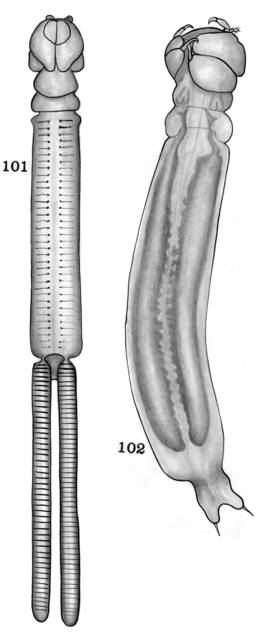WoRMS taxon details
Cybicola buccatus (Wilson C.B., 1922)
571976 (urn:lsid:marinespecies.org:taxname:571976)
accepted
Species
Cybicola elongata Pearse, 1951 · unaccepted (synonym)
Pseudocycnoides buccata (Wilson C.B., 1922) · unaccepted
Pseudocycnopsis buccata (Wilson C.B., 1922) · unaccepted (synonym)
Pseudocycnus buccatus Wilson C.B., 1922 · unaccepted (synonym)
Pseudocycnus elongatus (Heegaard, 1962) · unaccepted
marine
(of Pseudocycnus buccatus Wilson C.B., 1922) Wilson, C.B. (1922). North American parasitic copepods belonging to the family Dichelestiidae. Proceedings of the United States National Museum 60(5)(2400):1-100, pls. 1-13. (22-iii-1922). [details] 
Taxonomic remark Cybicola was proposed by Bassett-Smith as a replacement name for Helleria. It was not used in combination with any specific...
Taxonomic remark Cybicola was proposed by Bassett-Smith as a replacement name for Helleria. It was not used in combination with any specific epithet, which might indicate gender, so the gender is masculine following Article 30.1.4.2 of the Code [details]
Walter, T.C.; Boxshall, G. (2024). World of Copepods Database. Cybicola buccatus (Wilson C.B., 1922). Accessed through: World Register of Marine Species at: https://www.marinespecies.org/aphia.php?p=taxdetails&id=571976 on 2024-12-12
Date
action
by
![]() The webpage text is licensed under a Creative Commons Attribution 4.0 License
The webpage text is licensed under a Creative Commons Attribution 4.0 License
original description
(of Pseudocycnus buccatus Wilson C.B., 1922) Wilson, C.B. (1922). North American parasitic copepods belonging to the family Dichelestiidae. Proceedings of the United States National Museum 60(5)(2400):1-100, pls. 1-13. (22-iii-1922). [details] 
original description (of Cybicola elongata Pearse, 1951) Pearse, A.S. (1951). Parasitic Crustacea from Bimini, Bahamas. Proceedings of the United States National Museum 101(3280):341-372, figs. 67-77. (2-ii-1951) [details] Available for editors [request]
[request]
original description (of Cybicola elongata Pearse, 1951) Pearse, A.S. (1951). Parasitic Crustacea from Bimini, Bahamas. Proceedings of the United States National Museum 101(3280):341-372, figs. 67-77. (2-ii-1951) [details] Available for editors
 Present
Present  Present in aphia/obis/gbif/idigbio
Present in aphia/obis/gbif/idigbio  Inaccurate
Inaccurate  Introduced: alien
Introduced: alien  Containing type locality
Containing type locality
From editor or global species database
Taxonomic remark Cybicola was proposed by Bassett-Smith as a replacement name for Helleria. It was not used in combination with any specific epithet, which might indicate gender, so the gender is masculine following Article 30.1.4.2 of the Code [details]
To Biodiversity Heritage Library (2 publications) (from synonym Pseudocycnoides buccata (Wilson C.B., 1922))
To NMNH Extant Collection (Pseudocycnus buccatus; USNM 54077, 54078, 54079) (from synonym Pseudocycnus buccatus Wilson C.B., 1922)
To NMNH Extant Collection (Pseudocycnus buccatus; USNM 54077, 54078, 54079) (from synonym Pseudocycnus buccatus Wilson C.B., 1922)
To USNM Invertebrate Zoology Arthropoda Collection (1 record)
To USNM Invertebrate Zoology Arthropoda Collection (103 records) (from synonym Pseudocycnoides buccata (Wilson C.B., 1922))
To USNM Invertebrate Zoology Arthropoda Collection (3 records) (from synonym Cybicola elongata Pearse, 1951)
To USNM Invertebrate Zoology Arthropoda Collection (6 records) (from synonym Pseudocycnus buccatus Wilson C.B., 1922)
To USNM Invertebrate Zoology Arthropoda Collection (Holotype USNM 54077) (from synonym Pseudocycnus buccatus Wilson C.B., 1922)
To NMNH Extant Collection (Pseudocycnus buccatus; USNM 54077, 54078, 54079) (from synonym Pseudocycnus buccatus Wilson C.B., 1922)
To NMNH Extant Collection (Pseudocycnus buccatus; USNM 54077, 54078, 54079) (from synonym Pseudocycnus buccatus Wilson C.B., 1922)
To USNM Invertebrate Zoology Arthropoda Collection (1 record)
To USNM Invertebrate Zoology Arthropoda Collection (103 records) (from synonym Pseudocycnoides buccata (Wilson C.B., 1922))
To USNM Invertebrate Zoology Arthropoda Collection (3 records) (from synonym Cybicola elongata Pearse, 1951)
To USNM Invertebrate Zoology Arthropoda Collection (6 records) (from synonym Pseudocycnus buccatus Wilson C.B., 1922)
To USNM Invertebrate Zoology Arthropoda Collection (Holotype USNM 54077) (from synonym Pseudocycnus buccatus Wilson C.B., 1922)


